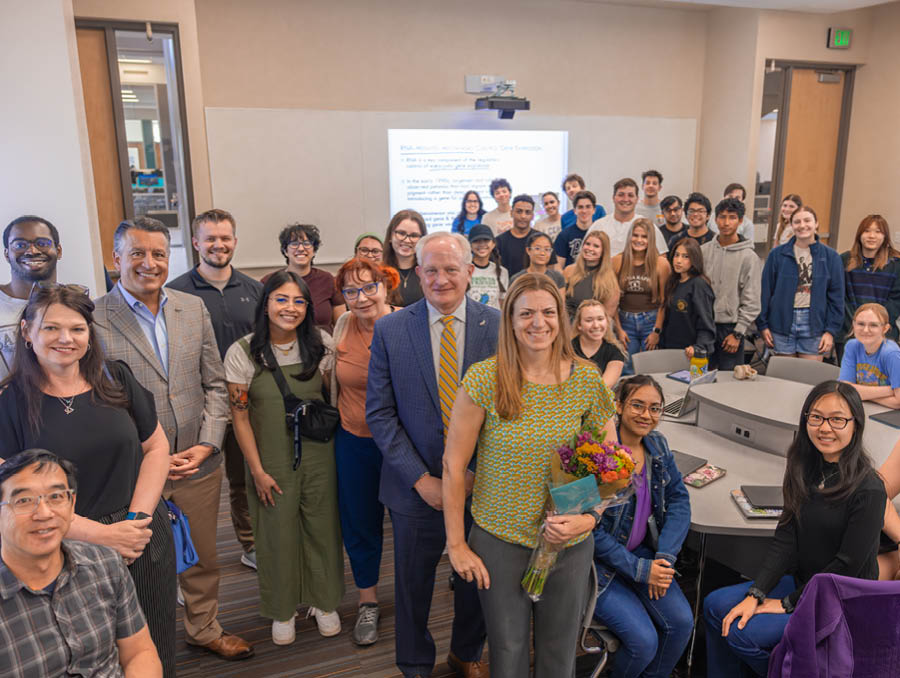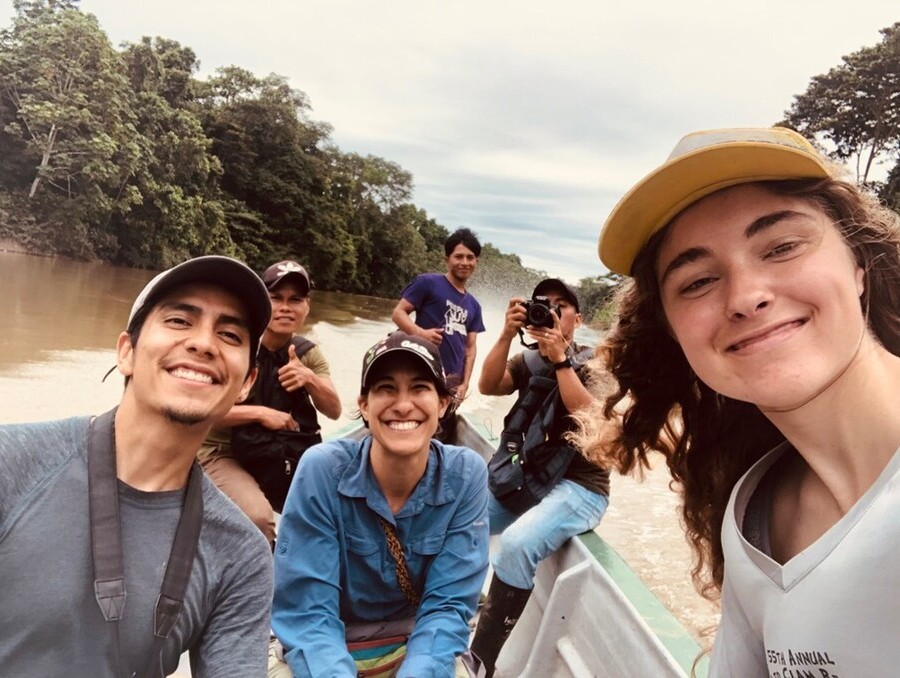Pamela Sandstrom, teaching associate professor in the Department of Biology, is no stranger to the term “going viral,” but typically she uses it as part of a lecture in one of her molecular biology courses. On April 23, Sandstrom’s classroom went viral in a new way, as President Brian Sandoval, Provost Jeff Thompson, department leaders, faculty, students, friends and colleagues all barged into her morning class to announce she had been selected as the 2024 Paul and Judy Bible Teaching Excellence Award winner.
“I saw President Sandoval and others through the long window adjacent to the door,” Sandstrom said. “A big smile came over my face and I paused to take a long, purposeful breath as I took it all in. Then, I told my class that we were going to have a fun interruption. I thought, ‘WE did it’! The ‘We’ could be that small group of 36 students in my new Molecular Genetics course who have been a delight to teach this spring, the more than 500 peer leaders and 13,000 students who I have had the privilege to help educate, or the mentors who helped me in my journey as an educator.”
The Paul and Judy Bible Teaching Excellence Award is special, like many of the other faculty awards on campus, but what sets this award and Sandstrom apart is that winners are entirely student nominated and the final selection process is rigorous. Sandstrom, overwhelmed by the support of her peers, said that this nomination felt especially personal as she was recognized by her incredible students who inspire her each day.
“It is a privilege to be able to positively impact our current students and to hear that they nominated me,” Sandstrom said. “The portions of my teaching portfolio that I will always cherish are the formal letters of support (especially those from current students and those continuing in graduate and medical school), as well as alumni statements (I’ve collected 110!, and most of them are ½ to a page long).”
Sandstrom is not only attentive to students, but also to the Department of Biology and beyond. In her time at the University, she has attended and presented at a multitude of conferences, has applied for grants for STEM education, and has established the Peer Mentorship Program in Biology and has developed new classes and curriculum that meet the needs of a diverse student body. But her impact on student success is monumental, and the care she brings to that success is what set her apart and earned her the award.
“Dr. Sandstrom has taught an impressive number of students in at least 15 different Biology courses, including lecture and lab courses, anatomy & physiology courses with labs, freshman seminar, and leadership courses,” Alexander Van der Linden, professor and chair in the Department of Biology, stated. “It is impossible to overestimate the positive impact Pamela has on her students and advisees. She is a truly an effective educator, mentor, and leader. Her engagement of undergraduates in peer teaching has broadly beneficial impacts that extend beyond their benefit for learning in Pamela’s classes.”
In a brief interview, Sandstrom went into further detail about her accomplishments, highlighting student successes and how she is able to connect to large groups of students in her classrooms.
You’ve taught over 10,000 students and counting in your career at the University so far, often teaching in high-enrollment and first-year classrooms. And your students clearly enjoy your teaching, as this award confirms! How do you command and engage large groups of students? What ways have you found for connecting with the students in your classroom on an individual level?
“I rely on others! The College of Science and Department of Biology have supported Dr. Elena Pravosudova and me as we have built a strong Peer Instruction Program over the years (since 2008). Students love their discussion group leaders and Learning Assistants (LAs). They create an environment that supports learning and build a community of learners across campus (and beyond, including many alumni). I have also enjoyed building relationships with incoming freshmen. I have been one of the first to teach our majors since the inaugural bootcamp called Bio FIT (with just 48 Biology and Neuroscience students in 2013), in First Year Experience classes (SCI 110), and more recently as an instructor for NevadaFIT (Science FIT).
“My experiences as a first-generation university student from a rural community help me relate to students. I gauge my students’ limitations, interests, and needs by listening and adapting to student feedback. I strive to clearly convey the course objectives and expectations and hold my students accountable for their learning. I am enthusiastic and encourage student engagement and inquiry from a diverse group of students. A collaborative learning environment helps foster teamwork and critical thinking skills that they will need in their future careers.”
In addition to teaching, you are a frequent and favorite advisor of undergraduate students. Your impact can be seen at almost every Westfall Scholar luncheon where you are consistently chosen by the biology student with the highest GPA in their department as their most influential faculty mentor. How do you use this role as an advisor to support students in their success?
“The best part of my job is helping students as a teacher and faculty mentor. My students have become my second family. I am appreciative of the Westfall family for recognizing our College of Science scholars. It was at these luncheons where I was first distinguished as an educator who was making a difference. I have been named a mentor for 17 Westfall Scholars over 11 years. When visiting my class, President Sandoval mentioned that eight Senior Scholars of the University of Nevada, Reno and its Alumni Association from three colleges and schools have also named me as their mentor. In a letter written by three current medical students, Jordan, a Y4 UNR Med student whom I have known since he took my undergraduate course over a decade ago, noted that ‘at our white coat ceremonies she photographed us with the pride of a devoted mother.’”
How would you describe your teaching style and how has it evolved throughout your career?
“Switching from traditional lectures to an active classroom has been a slow, demanding process. However, students have become more engaged since I introduced a hybrid format in my lecture courses. This includes an online component to make sure students come to class ready to participate in challenging active learning instant response questions and in mandatory discussion groups.”
What is the best piece of advice you would offer a new faculty member hoping to make an impact in the classroom?
“Make sure to be approachable and open to suggestions from your students and other faculty. Have the courage to make small changes and assess whether they improve learning.”
Anything else you’d like to add?
“Thank you to my family and friends! Most of my 16 years teaching at UNR have been as a single Mom; my two daughters have spent multiple nights curled up sleeping on my office chairs. I got my strong work ethic from my father who was a manager of a sawmill and compassion from my mother who has spent her life volunteering. A huge shout out to a group called ‘volleyball family’, amazing people who encourage me almost daily at the gym- Orange Theory Fitness (OTF), and any others in my village of family and friends who have helped keep me sane and raise my kids.
“Finally, of course, THANK YOU to my students! and faculty that I get to work with, as well as the Westfall family and the Nevada Alumni Association for recognizing students and their faculty mentors, and the Bible family for creating this award.”
















